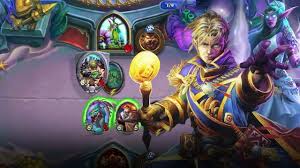Hearthstone, developed and published by Blizzard Entertainment, is an online digital collectible card game accessible for free. Initially titled Heroes of Warcraft, Hearthstone draws upon the rich lore of the Warcraft series, integrating familiar elements, characters, and artifacts. It made its debut on Windows and macOS platforms in March 2014, with subsequent releases for iOS and Android later that year. Offering cross-platform compatibility, players across different devices can engage in battles, subject only to regional account limitations.
The game unfolds as a turn-based duel between two adversaries, each armed with a deck of 30 cards and a chosen hero endowed with a unique ability. Players strategically expend their mana crystals to deploy abilities or summon minions for offensive maneuvers, aiming to vanquish the opponent’s hero. Victories and completed quests yield in-game currency, card rewards, and assorted prizes. With earned gold or through microtransactions, players can procure card packs to enrich and refine their decks. Various gameplay modes are available, including casual and ranked matches, arena drafts, and solo adventures. Periodic updates introduce fresh card sets and gameplay mechanics via expansion packs.
Unlike Blizzard’s traditional projects, Hearthstone emerged as an experimental venture undertaken by a smaller team, inspired by the allure of collectible card games within the company. It was crafted to circumvent common pitfalls of digital card games by enforcing turn-based mechanics and replicating the tactile feel of physical card games in its interface. Leveraging existing concepts and art assets from the physical World of Warcraft Trading Card Game, Hearthstone aimed to capture the essence of its source material. Receiving acclaim from critics and achieving commercial success for Blizzard, Hearthstone garners substantial monthly revenue, reportedly nearing $40 million by August 2017. Blizzard disclosed a player base exceeding 100 million by November 2018. The game’s popularity extends to the realm of esports, featuring lucrative tournaments hosted by Blizzard and various organizers, further cementing its status as a cultural phenomenon.
Set in the expansive Warcraft universe, Hearthstone stands as a digital-exclusive collectible card game, unfolding in turn-based clashes between two opponents. Players assume the mantle of one of eleven distinct hero classes, each imbued with unique cards and abilities, known as hero powers, shaping the strategic landscape. The ultimate objective is to deplete the opponent’s health pool to zero. Within Hearthstone’s arsenal are five card types: minions, spells, weapons, hero cards, and locations, ranked by rarity from Legendary to Free. Blizzard periodically introduces expansions and mini-sets to diversify the metagame, enhancing the game’s depth and longevity. Following a freemium model, players can opt for free gameplay or invest in additional card packs and content.
Distinguished from counterparts like Magic: The Gathering, Hearthstone prioritizes swifter gameplay by streamlining player actions and imposing turn timers. Players manage their resources, known as mana, allocated incrementally each turn to deploy cards from their hand, each card requiring varying mana costs. This necessitates strategic foresight as players plot their moves, weighing card capabilities and mana constraints. Minions, upon deployment, occupy the game board, boasting unique traits like Charge or Deathrattle, while spells exert diverse effects on gameplay dynamics. Acquisition of cards in Hearthstone occurs through either opening card packs or crafting them using arcane dust, affording players avenues to bolster their collections and tailor decks to preferred playstyles.
